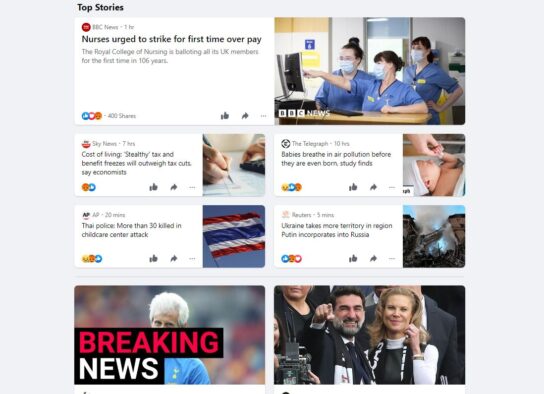
The Facebook News tab was launched in Britain with much fanfare last year as part of a $1bn global programme from the tech giant to support publishers.
Facebook said its aggregation service would become a “new destination for news” in the UK. Publishers, receiving payments from Facebook for their participation in the scheme, hoped it would mark the beginning of a good and fair licensing relationship with the tech giant.
Nearly two years on, the News tab remains something of a mystery to the media industry. It is unclear to many publishers who controls the tab, how stories are chosen for promotion, and how many Facebookers actually use the aggregator.
Today a Press Gazette investigation, based on information provided by News tab insiders, reveals new details about how the aggregation service is run.
We found:
● The tab is curated around the clock by a group of mainly freelance journalists who are contracted by Upday, an aggregation startup owned by Germany’s Axel Springer
● The curators’ work is guided by a spreadsheet of acceptable news websites and a curation guide drawn up by Facebook that dissuades journalists from sensationalist content and from focusing on crime-related stories
● Over the summer, freelances were told they would need to sign a new clause in their contracts that would stop them from working for “competitor” news organisations. This is despite the fact many freelances are technically on zero-hours contracts and are not guaranteed shifts on the tab
● These clauses were introduced by Upday, apparently at the direction of Meta, at a time when the future of the News tab – and freelances’ future shift work – is in doubt. Meta is believed to be phasing out the News tab internationally, and former insiders believe Upday’s contract to curate it in the UK only runs until April next year.
What is the Facebook News tab?
Facebook first launched its News tab in the United States in October 2019. For users, the tab – which is distinct from the Newsfeed and can be found on the left-hand side of the Facebook platform – provides an aggregation service that shares headlines, pictures and links to big news stories from trusted news websites.

The US launch came at a time when Facebook was coming under increased pressure to start paying news publishers for their content. Instant Articles, its previous effort to collaborate with publishers, had proved unpopular. Unlike Instant Articles, Facebook News takes you out of the app with links to publisher websites.
The News tab launch meant big money for partnering US news outlets. Press Gazette is aware of one major metropolitan daily newspaper group in the US that signed a three-year contract worth $500,000 a year. The Wall Street Journal has reported that it is paid more than $10m a year, The New York Times more than $20m, and The Washington Post more than $15m annually.
Facebook launched the News tab in the UK in January 2021. Partners included the Daily Mail, Guardian, Financial Times and Sky News, as well as regional publishers such as Reach and National World. Press Gazette is aware of one UK national news outlet paid around £1m a year, and a regional publisher that makes about £400,000 annually.
Upday and how the UK tab works
Ahead of the UK launch, Facebook struck a deal under which Upday, an Axel Springer company that also runs a news aggregation service on Samsung devices, was contracted to manage the Facebook News tab.
Since taking on the tab contract, Upday has employed a small team of editorial managers to liaise with Facebook and oversee the product’s curation.
Working beneath the in-house editors are around 15 curators who work remotely around the clock to manage the Facebook News tab. Their eight-hour shifts run from 6am to 2pm, 2pm to 10pm, and 10pm to 6am. Some curators have full-time, fixed-term contracts, but the majority work on a freelance basis, according to three former insiders. For freelances, the day shift paid £200, a weekend shift was £275, and an overnight shift was £350.
During shifts, curators would work with editors to read through articles on British news websites and to promote them on the tab with headlines, short blurbs and photographs.
“It was decent money for relatively easy work,” said one former curator. “The work was dull. It was repetitive. It wasn’t engaging. But the fact that it paid quite well meant that it was easy money.”
To assist their work, curators have access to a spreadsheet of appropriate news sites and a curation and style guide. This document encourages curators to avoid content with sensational headlines and to focus not just on politics, crime and tragedy.
Curators have little direct contact with Facebook. But they do take part in Monday afternoon meetings where Facebook News leaders brief them on which stories have performed best over the preceding week.
Two sources said that the best performing stories tend to be crime-related or “trashy stuff – not high-quality journalism”.
Facebook was generally “cagey” about giving out traffic figures, three Upday/News tab sources said. But one well-placed source estimated, based on the occasional figure that did slip out, a good story would attract 60-70,000 unique users and the most popular would send out hundreds of thousands of clicks to publishers.
A senior source at a large UK publishing partner said the news industry has also been frustrated by Facebook’s refusal to share traffic figures from the tab.
A former Upday staffer described Meta’s “caginess” around numbers as “a bit unusual”. “It was against the norm in the industry,” they said. “I’ve worked at places in the past where it’s all about the stats and numbers. That’s normally how you’d be judged on whether you’re doing things right or wrong.
“I never understood why they didn’t want us to know that stuff. It’s a bit odd when you’re engaged in a high-profile contract like this not to be given these figures. You want to be able to learn from what you’re doing.”
The new Facebook News tab contract clause
Between the tab’s launch in January 2021 and this summer, curators and journalists spoken to by Press Gazette were satisfied enough, if a little bored and bemused, by their work.
Crucially, many curators were pleased to be able to balance the good and easy money from Facebook/Upday with more worthwhile work at serious news organisations like the BBC, Reuters and Al Jazeera.
In June, Upday informed freelance curators that Meta was no longer happy for them to work with “competitors”. Upday said curators would have to sign a new contract with a clause stating that they would no longer work with other UK or US news organisations.
The tech giant had apparently expressed concerns about “curator bias” – i.e. that curators might favour promoting stories from the websites of news outlets with which they work. Former curators said this had not previously been raised as an issue and that, given their names do not appear next to stories, they would have no incentive to favour content from certain outlets.
News tab insiders spoken to by Press Gazette said the clause caused anger among curators because it forbade them from working for other news organisations despite effectively being on zero-hours contracts.
“The announcement was completely unprecedented and deeply unfair,” said one former curator. “It came as a shock to all those who were told to sign it.”
Another former curator said: “People were very unhappy with the new clause because it prevented any freelancer from having a second job in a media organisation in the UK.
“It was very broadly worded. Strictly speaking, I don’t think it prevented you from having a second job anywhere, but if you’re a freelance media worker in the UK, chances are your second job is going to be another media job.
“So even though it was strictly speaking not an exclusivity clause, as I understand it, in practical terms it was which defeats the purpose of being a freelancer in the first place.”
A former staffer said: “It makes no sense to hire freelances and expect them to work as if they’re in line with an exclusive contract.”
There was a suggestion from Upday in June that freelances could be offered full-time contracts to work on the tab. But Press Gazette has seen no evidence these contracts were offered.
In any case, many freelances would likely not have wanted to sign up to Facebook News full time. Many had longer-standing work relationships at reputable news organisations, like the BBC, Reuters and Al Jazeera, and would not want to give these up for the Facebook News tab.
The future of Facebook News and Upday’s contract
There is also uncertainty for curators about the future of the Facebook News tab and Upday’s role in its curation. A former staffer said that current curators “are worried about this”.
According to three former News tab/Upday insiders spoken to by Press Gazette, Upday’s original January 2021 contract ran for 12 months.
Facebook briefly extended the contract by a few months in early 2022, according to the sources, and then extended it again by another 12 months to April 2023.
According to one former Upday staffer, Facebook renewed its latest Upday contract with two weeks to spare, making curators feel unsettled.
Creating further uncertainty for staff and freelances, Upday previously held a contract to curate Facebook News in Germany as well. However, earlier this year, the contract was handed instead to the Deutschen Presse-Agentur (DPA), a Germany press agency. According to a German news source, this change came after rival publishers expressed concerns about Upday’s association with Axel Springer.
Even if Upday does land another contract extension, many in the media industry expect Meta to close the Facebook News tab altogether in 2024.
The technology giant has informed news companies in the US that it will not be renewing their three-year licencing deals this year. And it appears likely that the tab will subsequently be phased out in other territories once contracts run out.
An Upday spokesperson declined to comment on specific allegations made, only saying that some claims were false. The spokesperson said: “Upday’s curators select articles from regional, national and international publishers in line with our client’s editorial guidelines. We operate rigorous editorial standards to avoid conflicts of interest. All curators are empowered to make balanced, unbiased and independent decisions using their journalistic experience.”
Meta declined to comment.
Photo credit: Reuters/Dado Ruvic
Email pged@pressgazette.co.uk to point out mistakes, provide story tips or send in a letter for publication on our "Letters Page" blog
